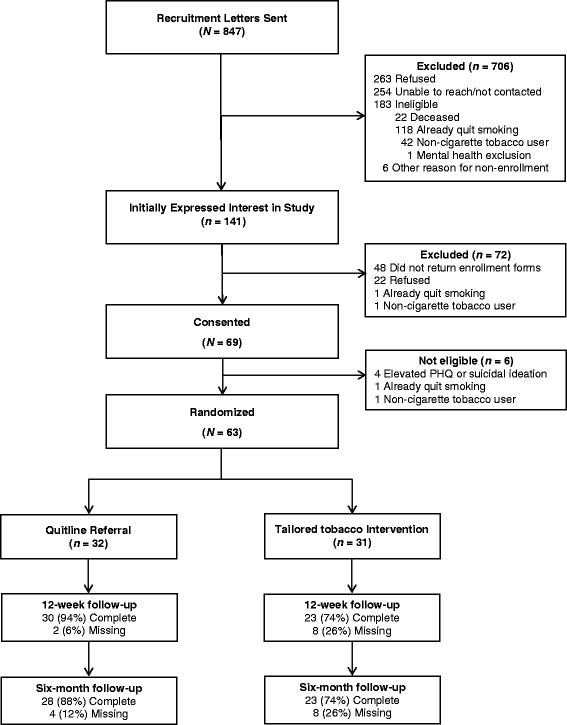An individually-tailored smoking cessation intervention for rural Veterans: a pilot randomized trial
- PMID: 27535024
- PMCID: PMC4989380
- DOI: 10.1186/s12889-016-3493-z
An individually-tailored smoking cessation intervention for rural Veterans: a pilot randomized trial
Abstract
Background: Tobacco use remains prevalent among Veterans of military service and those residing in rural areas. Smokers frequently experience tobacco-related issues including risky alcohol use, post-cessation weight gain, and depressive symptoms that may adversely impact their likelihood of quitting and maintaining abstinence. Telephone-based interventions that simultaneously address these issues may help to increase treatment access and improve outcomes.
Methods: This study was a two-group randomized controlled pilot trial. Participants were randomly assigned to an individually-tailored telephone tobacco intervention combining counseling for tobacco use and related issues including depressive symptoms, risky alcohol use, and weight concerns or to treatment provided through their state tobacco quitline. Selection of pharmacotherapy was based on medical history and a shared decision interview in both groups. Participants included 63 rural Veteran smokers (mean age = 56.8 years; 87 % male; mean number of cigarettes/day = 24.7). The primary outcome was self-reported 7-day point prevalence abstinence at 12 weeks and 6 months.
Results: Twelve-week quit rates based on an intention-to-treat analysis did not differ significantly by group (Tailored = 39 %; Quitline Referral = 25 %; odds ratio [OR]; 95 % confidence interval [CI] = 1.90; 0.56, 5.57). Six-month quit rates for the Tailored and Quitline Referral conditions were 29 and 28 %, respectively (OR; 95 % CI = 1.05; 0.35, 3.12). Satisfaction with the Tailored tobacco intervention was high.
Conclusions: Telephone-based treatment that concomitantly addresses other health-related factors that may adversely affect quitting appears to be a promising strategy. Larger studies are needed to determine whether this approach improves cessation outcomes.
Trial registration: ClinicalTrials.gov identifier number NCT01592695 registered 11 April 2012.
Keywords: Nicotine dependence; Rural health; Smoking cessation; Tobacco; Veterans.
References
-
- American Lung Association . Cutting Tobacco’s rural roots. Washington: American Lung Association; 2012.
-
- Bennett KJ, Olatosi B, Probst JC. Health disparities: a rural–urban chartbook. Columbia: South Carolina Rural Health Research Center; 2008.
Publication types
MeSH terms
Associated data
Grants and funding
LinkOut - more resources
Full Text Sources
Other Literature Sources
Medical
Miscellaneous


